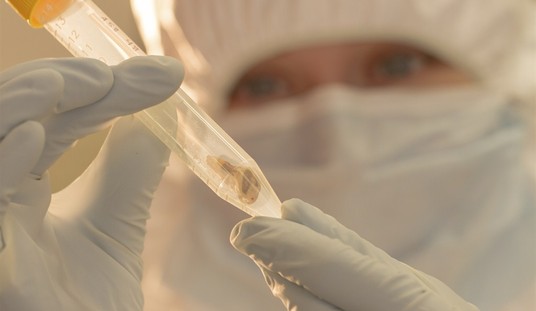Ever since the New Yorker published audio of Harvey Weinstein cajoling Ambra Battilana to enter his room, the NYPD and the District Attorney have been pointing fingers at each other. The central question is this: Why wasn’t Weinstein prosecuted based on the information available back in 2015?
As Ed noted last October when the audio first became news, the DA’s office said the NYPD had screwed up the investigation by failing to get proper direction. The NYPD responded that its Special Victim’s Unit had plenty of experience in handling sex crimes and blamed the DA for going easy on a powerful man. Last Friday afternoon, this simmering story erupted again when New York Magazine published a story arguing that the DA’s office had stepped in to protect Weinstein:
As Battilana was providing her account to the SVD detective, she got an email from Weinstein. Why hadn’t she shown up at the theater, he wanted to know. Recognizing an opportunity for a “controlled call” — a police technique used to solicit and record incriminating evidence — the detective instructed Battilana to reply to the email and say that she didn’t have his phone number. They exchanged numbers, and Weinstein called.
“How did my breasts feel?” Battilana asked him, as the detective had coached her. (A flat-out accusation isn’t a good strategy for a controlled call. “Why did you touch my breasts?” is only likely to prompt an apology, which isn’t an admission.)
“They felt beautiful,” Weinstein replied, according to a source who heard the recording. “They’re great.”
The NYPD used that exchange to set up a sting for the next day. Battilana would wear a wire and meet with Weinstein in person to try to get a recording of him admitting to the assault. The NYPD contacted Martha Bashford who handled sex crimes for the Manhattan District Attorney’s Office and let her know about the planned sting. According to them, she gave the okay but did not take any further interest in overseeing the case.
After recording the audio (see below), the NYPD asked Weinstein to come down to the station. He immediately started threatening the detectives and saying he would call the Chief of the NYPD. As soon as Weinstein learned who had accused him, he lawyered up. Not just any lawyers, but two with connections to the DA’s office. And shortly after that, the DA’s office began its investigation into Battilana’s story, an investigation which the NYPD felt was strangely accusatory. In fact, the police decided they would stash Battilana in hotels to help her avoid the District Attorney’s investigators.
On April 1, five days after Battilana had filed her complaint, Bashford conducted an interview with her. The next day, sources say, Vance’s office sent its own investigators to Battilana’s apartment. There, according to Bock, they aggressively questioned her roommates. Was Battilana a prostitute? Did she bring home lots of strange men? Was she a stripper? The DA’s office also reviewed video from the apartment building’s surveillance cameras, which would enable them to create a record of Battilana’s personal life. “When she found out about this, the victim became afraid,” recalls Bock. “She began to cry.”
According to Bock, Osgood believed that Vance and his office were actively working to discredit Battilana. So the chief and his team decided to take an extraordinary step. “We decided we’re going to hide the victim,” Bock says. “From the DA.”
On April 2, under the direction of Osgood, the SVD put Battilana in a hotel, registering her under a false name. For the next five nights, she was kept safe from Vance’s investigators, first at the Franklin Hotel, then at the Bentley. A 22-year-old woman had come forward to accuse one of the most powerful men in Hollywood of sexual abuse, and the police decided she needed protection — not only from her alleged assailant, but from the elected official responsible for prosecuting him.
After five days in hiding, Battilana agreed to meet with the prosecutor’s office. Representatives for the NYPD showed up at the meeting and again found the tone accusatory, including questions about Battilana’s attendance at sex parties with Italian prime minister Silvio Berlusconi. Three days later, the District Attorney announced he would not prosecute Weinstein. For its part, the DA’s office denies everything in the New York story. It claims it was never informed about the planned sting and that it never questioned Battilana’s roommates.
Today, the activist group Time’s Up called on NY Gov. Andrew Cuomo to open an investigation into the DA’s office over it’s failure to prosecute Weinstein in 2015. The group’s letter was published by New York magazine’s The Cut.
Reports that District Attorney Cyrus Vance could have been improperly influenced by Mr. Weinstein and/or his representatives, and that senior officials within the DA’s office may have sought to intimidate Battilana are particularly disturbing and merit investigation. Similarly, reports that the New York Police Department chose to isolate Battilana from Vance’s staff because they feared his office was actively working to discredit her story demand immediate scrutiny.
An independent investigation into the full decision-making process in this case, including a full review of the correspondence within the office and with any representatives for Mr. Weinstein, must be undertaken immediately to ensure that prosecutorial integrity was maintained and to restore faith in the DA’s office.
In response, the DA’s office issued this statement:
— Cyrus Vance, Jr. (@ManhattanDA) March 19, 2018
It certainly sounds like the NYPD had a problem with how the case was handled in 2015. The wildcard in this discussion is the possibility that the DA’s office, which is still investigating Weinstein, may find some grounds to charge him. That would probably take some of the heat off Vance’s office if it happens.








Join the conversation as a VIP Member